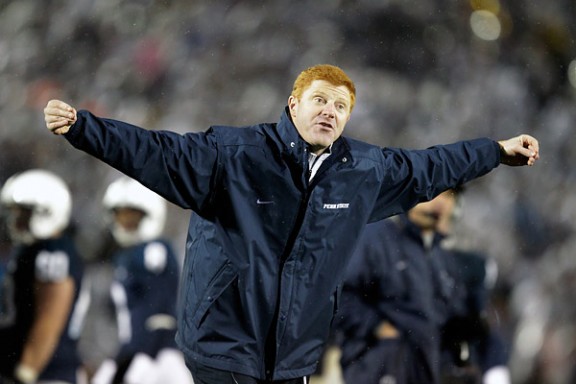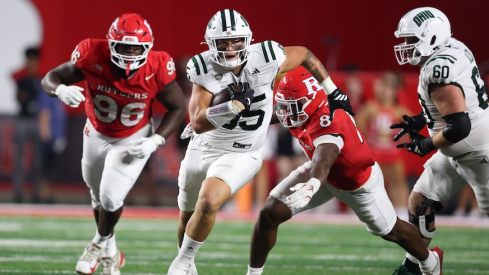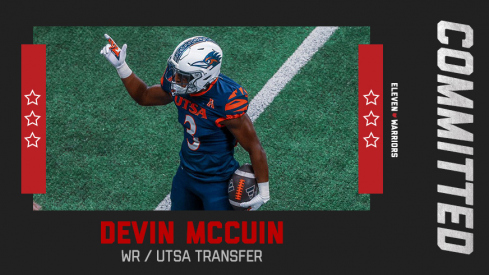 Just close your eyes and it will disappear.
Just close your eyes and it will disappear.Penn State started its 2001 football season by losing each of its first four football games by a combined score of 31-95.
The Nittany Lions eventually finished the season 5-6 and home for the holidays without a bowl invitation, which was a rarity in the storied tenure of Joe Paterno.
The only high point of the season occurred when the 74-year old coach earned his 324th victory and passed Paul "Bear" Bryant for career wins in major college football. However, his 35-year legacy and that crowning achievement as D-IA's winningest coach were both marred by a very mediocre 2001 team.
All was not well in State College. Two years earlier, a very promising 1999 season had spiraled late in the year with three consecutive losses. It seemed likely Penn State football was headed for decline.
Additionally, the program had been increasingly finding itself in the news for the wrong reasons: Tailback Curtis Enis was suspended for agent involvement and receiver Joe Jurevicius was kicked off the team for academic problems a couple of seasons earlier.
Linebacker Mac Morrison was arrested for disorderly conduct the year prior and safety Askari Adams got a DUI during the season. The bad news along with the mediocre results were infecting JoePa's legacy and people began to discuss if it was the beginning of the end.
When asked if Paterno was losing his grip on the program, Florida State coach Bobby Bowden - who was also facing questions about his advancing age - jumped to his defense and blamed...the Internet.
"(Off-the-field issues) have been going on for 2,000 or 3,000 years," said Bowden. "So why is this so alarming now? I'll tell you why. Everybody in the world knows about it now when you make a mistake."
Less than a month after signing the recruiting class that followed that 2001 season and amidst new pressure mounting for Paterno to retire, graduate assistant Mike McQueary ran into the Penn State locker room to retrieve some shoes and video tapes. And then this happened:
"...he was surprised to find the lights and showers on. He then hear rhythmic, slapping sounds...he looked into the shower....he saw a naked boy, whose age he estimated to be ten years old, with his hands up against the wall, being subjected to anal intercourse by a naked (Jerry) Sandusky."
McQueary had stumbled upon the anal rape of a little boy in the Penn State football locker room by a 36-year veteran of the football program. If you describe the act to yourself in vague terms instead of anal rape, you're just deluding yourself. It was anal rape of a boy by a middle-aged man.
According to Grand Jury testimony that went public two weekends ago, McQueary reported the incident to Paterno and called it "anal rape."
Paterno had already seen an uptick in bad news around his program. This was far more gruesome than any bad news that had been attached to Penn State football at that point.
Later, after being informed of the anal rape of a boy in his locker room, Paterno blurred Sandusky's crime as "something of a sexual nature." The news went up the chain of command. Nobody wanted to deal with what actually happened. It would be far too damaging and embarrassing to the university.
Penn State Vice President Gary Schultz later described the anal rape of a boy in the Penn State locker room as "inappropriately grabbing of the young boy's genitals." This could be interpreted as an innocent butt-slap that unintentionally went south, literally and figuratively.
Penn State Athletic Director Tim Curley described anal rape of a boy as "inappropriate conduct or horsing around." University President Graham Spanier described anal rape of a boy as "conduct that made someone uncomfortable."
Jack Raykovitz, the President of The Second Mile charity that provided constant access and contact between Sandusky and minors described anal rape of a boy as "a ban on bringing kids to the locker room."
As a result, Sandusky continued to practically live in the Penn State football facilities for nine more years while spending ample time around young boys.
With his control on the program slipping, the revelation of Paterno's closest coaching confidante raping a boy in the locker room would have inevitably brought about an investigation that likely would have uncovered that Paterno had actually known for years about Sandusky's serial pedophilia yet had not reported it or taken appropriate action.
So Paterno and his superiors all consciously made the decision to make the boy go away to protect themselves, the university and the rapist Sandusky.
A little cognitive dissonance goes a long way, and it did. Everyone looked the other way. The raped boy was no longer a problem.
Penn State football was going to be okay simply because of who the victim was. He was someone else's boy - or even better - he was nobody else's boy; as were the other boys that Sandusky had and then continued to rape after Paterno's forgettable, historic 2001 season.
The questions about Paterno retiring never went away. More importantly, the questions about Sandusky never surfaced. Until they did.
Since the Penn State story broke there have been some lame journalistic attempts to bridge what happened in State College with what has occurred recently at Miami and Ohio State, mostly by fake news organizations like ESPN that routinely dumb down and package all information as entertainment.
The Ohio State comparisons were only lame because comparing unreported major felonies to covering up non-criminal NCAA violations is almost as mind-numbing as the NCAA itself. The only basis for comparison was that those in power looked the other way when they shouldn't have.
All else being equal (it's not) the actions were similar. The reality is that looking the other way is an unwritten job requirement not only in college coaching, but in college fandom.
Back in 2001 when Bowden, who is college football's undisputed king of successfully looking the other way came to Paterno's defense, what he was essentially saying was that technology was making it harder and harder for coaches to look the other way.
Bowden played the role of the naive grandpa for decades in Tallahassee, whether his players were emptying the shelves at the local Foot Locker, walking out of Dillard's department store with bags of unpaid merchandise or getting dubious disability diagnoses that resulted in about half of his team basically having schoolwork done for them.
But Bowden did so much else that was good for the university, college football and the community. And he won a lot of games. And he's got a great personality.
Similarly, everyone's favorite coach who exemplifies integrity, John Wooden, looked the other way for years while Federal money launderer and racketeer Sam Gilbert delivered top recruits to UCLA.
Wooden apologists still look the other way to avoid diminishing the legacy of a coach who won nothing for 15 seasons and then ten titles in a dozen years which all happened to overlap with Gilbert's recruiting involvement with UCLA basketball.
 McQueary is 6"5, 260 lbs. He saw a boy being anally raped and walked away.
McQueary is 6"5, 260 lbs. He saw a boy being anally raped and walked away.But Wooden did so much else that was good. And he won a lot of games. And he had a great personality.
Bowden ending the gravy train at Florida State might have disrupted a decade that had Florida State ranked among the top five or winning the national title seemingly as a right of existence.
His inaction kept the best players on campus and winning games.
Wooden putting a stop to Gilbert's illicit recruiting practices might have kept him an ordinary coach, as he had been for the better part of two decades.
His inaction kept the best players in the country coming to UCLA while a drug-running money launderer stayed in business and out of prison. Gilbert's victims were faceless, therefore they didn't exist and his presence around the program was acceptable.
The University of Miami has celebrated its rogue football culture for the better part of four decades. Before Nevin Shapiro was a sugar daddy to five dozen Hurricanes, Luther Campbell was doing the same thing - and without being policed with the kind of urgency a program on the level might demonstrate.
Their inaction kept the talent level in Coral Gables so high it has been called NFL U.
Jim Tressel sat on information that would have made some of his best offensive players at their positions ineligible. Try and imagine of Christopher Cicero's email had instead named Taylor Rice, Vince Petrella, Dan Bain, Dalton Britt and Derek Erwin as the Tat Five.
He might have been more inclined to report it. Which players? Exactly. He knew losing the players who were involved would have decimated his team, and he was right. Protecting lower profile players from the NCAA would have carried exponentially less reward with the exact same risk.
But Tressel did so much else that was good for the university, college football and the community. And he won a lot of games.
And his personality - or lack thereof where journalists were concerned - made looking the other way nearly impossible for his critics. Personally, I love Tressel and loathe the NCAA. I'm happy to look the other way. The violations he covered up in that email involved stupid, arcane rules. That still makes him a cheater.
Paterno took a pass on reporting a raping pedophile to protect the most powerful figure in Penn State history: The little old guy in the mirror that everyone loves.
The transgressions are not comparable but the motives are: The strong were protected at the expense of the weak.
Contrary to popular belief, the Sandusky story did not break into the news cycle until recently. It was actually in the news on March 31 of this year.
Barely anybody paid attention to the story. Journalists certainly didn't: Around the end of March much of the media were too busy furiously submitting Freedom of Information requests to Columbus to get to the bottom of Tressel's horrifically evil cesspool of lies.
Reporters from all over the country were tripping over each other trying to feign the most outrage over all that was wrong with college football; so much so that they didn't notice a story about a Grand Jury, Sandusky and serial child molestation.
Meanwhile, nobody bothered to ask any questions - not just last April, but for decades - about Sandusky. Everyone was looking the other way.
It was nine years to the month that McQueary had watched Sandusky raping a boy in a Penn State football facility. And what he saw that day haunted him so much that he still wrote sickening letters like this to recruits about the virtue of being at Penn State, versus other places.
McQueary is obviously proud of his alma mater and he advanced his coaching career there over those past nine years. Reporting Sandusky might have derailed his advancement and threatened his position within a program any aspiring coach would join if offered.
Instead he chose to protect and perpetuate an edifice of chastity whose architect was Paterno. Someone else's kid getting raped wasn't worth damaging that edifice. Keeping Sandusky out of prison was the triumph of selfishness.
And while Penn State officials did nothing to bring what was happening to the surface, the media's romanticizing of Paterno - whom many had thought to be past his prime nine years ago - continued unabated.
After the March story of Sandusky broke, not only did the massive conflict of interest in Bristol stay completely fixated on Columbus, it worked itself into a lather to create a dichotomy of Good vs. Evil.
During the "Summer of Tressel" ESPN hitched itself to Paterno's integrity as a palate cleanser for its Ohio State coverage. The Sandusky story just sat there, marinating, unnoticed and underreported. The media asked no questions. Everyone looked the other way.
In retrospect, all of the outrage wasted on Tressel now seems about as forced and awkward as when your elderly relatives post on Facebook.
What's infinitely more disgusting than the cesspool in Columbus? Thanks to the hyperbolic Ohio State scandal reporting this year, brand new words must be created to truly capture what has happened at what was commonly held up as a paragon of what's right with college football.
When it comes to minor inconveniences, coaches will look the other way. Bowden looked the other way. Tressel looked the other way. Wooden looked the other way. Their fans will look the other way. The media will also look the other way.
If Paterno was willing to ignore a pedophile in his ranks who was raping kids inside of Penn State football facilities it is hard to imagine that he was actively policing lesser transgressions. He was very likely looking the other way, just like every other coach tries to do, just as he did with Sandusky.
Paterno was so bothered by what happened at Ohio State that he actually refused to read the stories about Tatgate. That is all the clarity you need to understand why he declined to pursue more specific information about what Sandusky was doing on and off PSU property.
The winningest coach in FBS history had cognitive dissonance down to an art form. Paterno had grown so accustomed to looking the other way that he consciously declined to protect those who couldn't protect themselves. Sandusky committed the crimes but Paterno had ample power to remove him from society.
That level of failure of a coach for whom statues have already been constructed doesn't just taint his legacy. It has to help define it, because it is impossible to look the other way.

